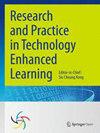What we have learned from adult students' online learning experiences to enhance online learning of other students' groups?
IF 3
Q1 EDUCATION & EDUCATIONAL RESEARCH
Research and Practice in Technology Enhanced Learning
Pub Date : 2023-05-15
DOI:10.58459/rptel.2024.19006
引用次数: 1
Abstract
Adults used to be the largest online student population before the COVID-19 pandemic. However, the number of online students multiplied during the pandemic, and now includes the complete conglomeration of all student groups. Due to their longer experience of online education, adult students continue to provide valuable insights on how to enhance online learning for other higher education students. This article reports the results of phenomenographic research on the qualitative differences in the ways of experiencing learning by fifteen adult students enrolled in two online postgraduate programmes. The analysis on in-depth, participant-led interviews demonstrated that online learning is conceptualised in three ways: as an investment, as a process that brings structure, and as a process that enables and empowers an individual. The results of this study are of particular importance for those who are concerned with introducing online learning to the higher education curricula. The paper argues that the stigma of online education being the second choice, maintained in the educational research literature, should be replaced by a holistic approach to education as a process that organically incorporates the online educational elements into higher education. Focusing on how adult students experience online learning provides a broader and deeper understanding of adopted effective practices and the variety of online learning opportunities and outcomes for other students’ groups. Insights based on the results of this study are summarised.我们从成人学生的在线学习经验中学到了什么来加强其他学生群体的在线学习?
在COVID-19大流行之前,成年人曾经是最大的在线学生群体。然而,在大流行期间,在线学生的数量成倍增加,现在包括所有学生群体的完全聚集。由于成人学生的在线教育经验较长,他们继续为其他高等教育学生提供如何加强在线学习的宝贵见解。本文报告了对参加两个在线研究生课程的15名成人学生体验学习方式的质性差异的现象研究结果。对参与者主导的深度访谈的分析表明,在线学习可以从三个方面进行概念化:作为一种投资,作为一种带来结构的过程,以及作为一种使个人获得能力和授权的过程。这项研究的结果对于那些关注将在线学习引入高等教育课程的人来说尤为重要。本文认为,在教育研究文献中,在线教育是第二选择的耻辱应该被一种整体的教育方法所取代,这种方法是将在线教育元素有机地纳入高等教育的过程。关注成人学生如何体验在线学习,为其他学生群体提供了对所采用的有效实践和各种在线学习机会和结果的更广泛和更深入的理解。总结了基于本研究结果的见解。
本文章由计算机程序翻译,如有差异,请以英文原文为准。
求助全文
约1分钟内获得全文
求助全文
来源期刊

Research and Practice in Technology Enhanced Learning
Social Sciences-Education
CiteScore
7.10
自引率
3.10%
发文量
28
审稿时长
13 weeks
 求助内容:
求助内容: 应助结果提醒方式:
应助结果提醒方式:


